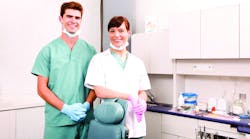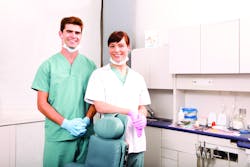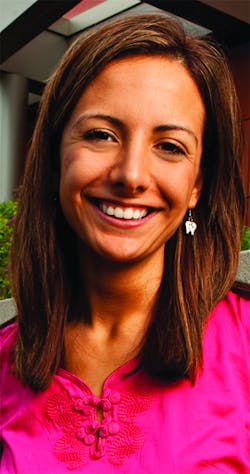By Trish De Dios
April 18, 2013
Editor’s Note: This article originally appeared in the March edition of RDH. It has been edited for publication on DentistryiQ.com.
This column is tailored for the recent graduates; many of them are part of the Millennial generation – born between 1980 and 2000. We are known to be tech-savvy, multi-tasking social media gurus who are obsessed with our personal technological devices – generally, the movers and shakers. We are described as confident and can be misread as being demanding because Millennials prefer autonomy in the workplace and having their opinion carry some weight.(1) They want to be part of collaboration; they want to participate and be innovative. In the workplace, Millennials are said to desire a personal connection with their work, and we want our work to be meaningful.(2) Who wouldn’t? These are reportedly some strong attributes of this generation, and I enjoy thinking of these things as they apply to a dental hygienist.
The question “Can I have that yesterday?” reflects the attitude Millennials have when it comes to getting what they want. The rumor is that we expect 24-hour service and want things to happen pretty much yesterday. In our defense, this is just encouraged by what technology has afforded us. I can easily think of a dozen things I can do in a moment’s time – share a photo, transfer money, schedule a doctor’s appointment, and buy movie tickets, among a plethora of other things. The mindset I’m describing is what I want to discuss as it relates to the dental hygienist.
How millennial traits can work to your advantage – or disadvantage
At the end of our dental hygiene schooling, we are at the top of our game. Our confidence is high, but transitioning into a private practice decreases confidence in our skills, and we are now expected to perform for real patients of a private practice and work alongside a practicing dentist and staff we aim to impress.
This scenario can be overwhelming to new graduates, and our Millennial thought processes could make the transition tough, since we would like to fit in with the team and “win” patients over immediately. One of my mistakes as a new graduate was not being able to see past the imperfections of an office. I made it my priority to initiate changes, which is right in line with Millennial stereotypes. A headstrong, aggressive approach like this was not the best plan, because, in the hopes of implementing change, I was missing out on my new experiences and learning from them.
A good friend recently told me that, when I call him, he closes his laptop, turns off the TV, and proceeds to give the conversation 100% of his attention. I was taken back by this, since all my phone conversations usually are supplemented with Internet browsing, television watching, and, on some occasions, even texting. Intrigued by this, I probed further and learned that, although he was perfectly capable of multitasking, he realized he wasn’t giving people the attention they deserved and was probably only absorbing a fraction of what he could give.
This “aha” moment left me thinking of my early experiences in the office and how I probably short-changed myself on some learning opportunities because of my drive to move ahead and change things so hurriedly. We must be cautious not to let our generational tendencies compromise our learning and growth.
On the other hand, we should use our Millennial strengths when appropriate. When it comes to patient care, don’t worry about what you might not know or what you don’t understand about each clinical case. The truth is that you are a qualified clinician, and every patient can be a new learning experience. I remember the very first patient I saw in private practice. Neither the doctor nor the patient knew it was my first clinical experience since graduation. I followed the sequence I learned from school, starting with the review of the medical history to the flossing of all contacts at the end of the appointment. The patient left very pleased and even praised me in front of the dentist.
There are a few reasons why the appointment went well. First, I acted confident. While a clinic jacket may not look good on everyone, confidence does – and apparently Millennials are known for wearing confidence well. My attitude was the variable that I could control. I was strategic in my demeanor from the moment I called the patient from the waiting room. I strived to make a strong first impression with the office staff and with the patient – they would be judging me by the rapport I established.
To this day, I still find myself sifting through my strengths and Millennial tendencies as a dental hygienist. I’ve applied concepts that work and some that didn’t work. Being malleable is important. Some say, “If you don’t bend, you will break.” Hygienists are committed to being lifelong learners, but we also know that changes in our profession often happen slowly. It’s inspiring to see many of my peers take initiative and get involved in professional growth. As Millennials, we are not afraid to lead, collaborate, or compromise; we often just wish we had all that we strive for, well, yesterday.
References
1. The New Millennial Values. Forbes Magazine. Jul. 4. 2012. Retrieved from http://www.forbes.com/sites/prospernow/2012/07/05/the-new-Millennial-values/ on Dec 8, 2012.
2. Millennial Generation Trends for 2012. Your Success Network. Retrieved from http://ysn.com/Millennial-generation-trends-for-2012/ on Dec8, 2012.









